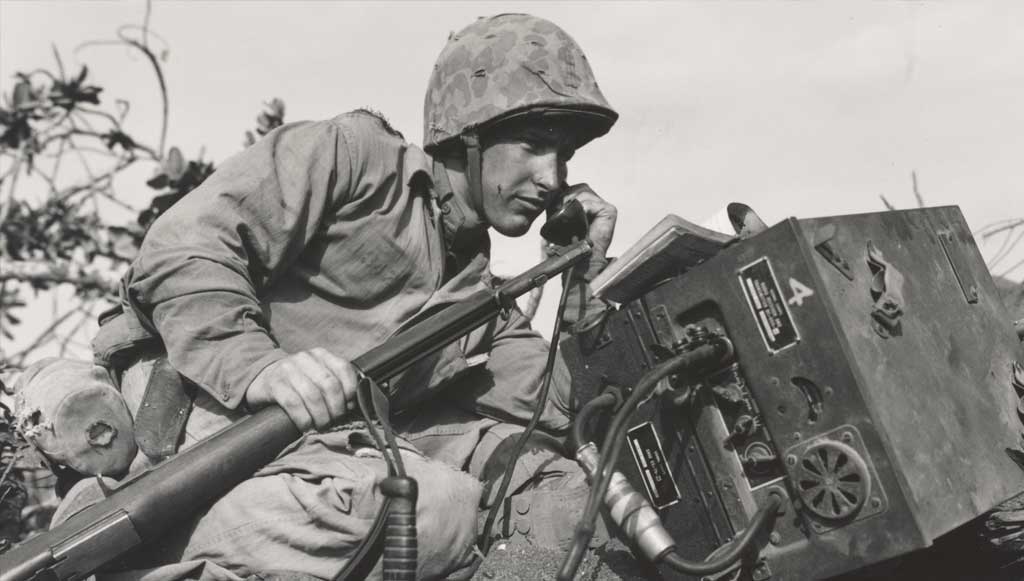Navy Corpsmen at Iwo Jima

At the website of the Navy’s Bureau of Medicine and Surgery, one finds an article titled “Beyond Heroism: Hospital Corpsmen and the Battle for Iwo Jima,” that captures in a concise expression the courage displayed by the corpsman who went ashore with Marines at Iwo Jima.[i] On the morning of February 19, 1945, Marines of the 4th and 5th Divisions began their assault on Iwo Jima. At first, resistance was light, but when the beaches became crowded with men and equipment, the Japanese defenders of the island set upon the invaders with a deadly attack using artillery, mortars, and rockets. The attack took many casualties, and the corpsmen with the Marines took to the challenge.
Hospital Apprentice First Class James Twedt, a 19-year-old with the 26th Marines, was wounded as he approached some wounded Marines. One of his feet was blown off and the other mangled, yet he dragged himself across the ground to care for two wounded Marines whom he stabilized before being relieved by another corpsman. Pharmacist’s Mate Third Class Herman Trevor was with a mortar platoon that came under heavy fire. Trevor ran from his sheltered position to care for four wounded Marines. After applying a tourniquet to a Marine who lost a leg, Trevor treated other Marines for hemorrhage and shock before sprinting 75 yards under fire to find a litter team to remove the Marines from the battlefield. Pharmacist’s Mate Third Class Byron Dary was a recipient of a Silver Star for bravery during the Normandy Invasion in 1944. Dary was at Iwo Jima with the task of seeing to the evacuation of casualties. Repeatedly, Dary left cover to collect medical supplies scattered around the beach, but when calls for more corpsmen came, Dary worked to support FMF corpsmen providing emergency medical care, which he did until being killed by enemy fire. Next to Marine litter bearers, corpsmen had the heaviest casualty rate, often being the targets of snipers.
Depending on the battalion, casualty rates among corpsman were between 50% and 68%. Over the course of the battle (36 days), 332 corpsmen were killed in action or died subsequently from wounds, and another 659 corpsmen suffered wounds requiring evacuation. Among the corpsmen in the Battle of Iwo Jima, 14 received Navy Crosses, 108 were awarded Silver Stars, 287 received Bronze Stars, and 4 received Medals of Honor: Francis Junior Pierce, George Wahlen, Jack Williams, and John Willis.
John Willis was a 23-year-old corpsman with the 27th Marines. Sent to an aid station with shrapnel wounds, Willis chose instead to continue treating Marines. While administering plasma to a wounded Marine in a “shell hole,” Willis came under a grenade attack. Eight grenades were lobbed into Willis’ shelter and each one he picked up and threw back at the enemy. A ninth grenade killed Willis and the Marine he was treating. In December of 1945, Secretary of the Navy James Forrestal presented a posthumous Medal of Honor to Willis’ widow and newborn son.
The Medal of Honor citation for Jack Williams reads in part as follows.
For conspicuous gallantry and intrepidity at the risk of his life beyond the call of duty while serving with the 3rg Battalion 28th Marines, 5th Marine Division, during the occupation of Iwo Jima Volcano Islands, March 3, 1945. Gallantly going forward on the frontlines under intense enemy small-arms fire assist a marine wounded in a fierce grenade battle, Williams dragged the man to a shallow depression and was kneeling, using his own body to screen from the sustained fire as he administered first aid, when struck in the abdomen and groin 3 times by hostile rifle fire. Momentarily stunned, he quickly recovered and completed his ministration before applying battle dressings to his own multiple wounds. Unmindful of his own urgent need for medical attention, he remained in the perilous fire-swept area to care for another marine casualty. Heroically completing his task despite pain and profuse bleeding, he then endeavored to make his way to the rear in search of adequate aid for himself when struck down by a Japanese sniper bullet which caused his collapse. Succumbing later as a result of his self-sacrificing service to others, Williams, by his courageous determination, unwavering fortitude and valiant performance of duty, served as an inspiring example of heroism, in keeping with the highest traditions of the U.S. Naval Service. He gallantly gave his life for his country.
Both George Wahlen and Francis Junior Pierce were wounded in the battle, but both survived and went on to lives after the war. The Department of Veterans Affairs Medical Center in Salt Lake City is named for Wahlen, and in 2003, Hasbro toy company issued a G.I. Joe action figure commemorating Francis Pierce, the only corpsman so honored.
The story of corpsmen in the Battle of Iwo Jima is a sobering account of courage and service that underscores the importance of remembering those who have risked, and even lost, life in defense of their country.
[i] The article may be found here: https://www.med.navy.mil/Media/News/Article/2609655/beyond-heroism-hospital-corpsmen-and-the-battle-for-iwo-jima/


